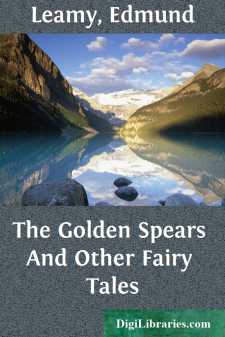Categories
- Antiques & Collectibles 13
- Architecture 36
- Art 48
- Bibles 22
- Biography & Autobiography 813
- Body, Mind & Spirit 142
- Business & Economics 28
- Children's Books 15
- Children's Fiction 12
- Computers 4
- Cooking 94
- Crafts & Hobbies 4
- Drama 346
- Education 46
- Family & Relationships 57
- Fiction 11828
- Games 19
- Gardening 17
- Health & Fitness 34
- History 1377
- House & Home 1
- Humor 147
- Juvenile Fiction 1873
- Juvenile Nonfiction 202
- Language Arts & Disciplines 88
- Law 16
- Literary Collections 686
- Literary Criticism 179
- Mathematics 13
- Medical 41
- Music 40
- Nature 179
- Non-Classifiable 1768
- Performing Arts 7
- Periodicals 1453
- Philosophy 64
- Photography 2
- Poetry 896
- Political Science 203
- Psychology 42
- Reference 154
- Religion 513
- Science 126
- Self-Help 84
- Social Science 81
- Sports & Recreation 34
- Study Aids 3
- Technology & Engineering 59
- Transportation 23
- Travel 463
- True Crime 29
The Golden Spears And Other Fairy Tales
by: Edmund Leamy
Categories:
Description:
Excerpt
PREFACE
It comes to me as a very welcome piece of news, and yet a piece of news which I have been long expecting, that a special American edition of Edmund Leamy's Irish fairy tales is about to be published. This, then, will be the third issue of the little book. I venture to predict that it will not be the last; and I fancy the American publisher who has had the judgment to take the matter up will soon be rewarded for his enterprise. For I believe the book to be a little classic in its way, and that it will go on making for itself a place in the libraries of those who understand children, and will hold that place permanently.
This is the verdict of competent literary judges. I am spared the necessity of attempting a discussion of the grounds on which so strong an opinion of Leamy's fairy tales is based by the fact that this is already done in Mr. T. P. Gill's Introductory Note. Mr. Gill, though he was, like myself, one of Leamy's intimate friends, is a conscientious critic, and to his analysis not merely of the "Tales," but of that attractive personality which Leamy infused into all he said or wrote I can safely refer the reader. I think no one of taste and judgment who reads these Tales will fail to agree with the view which is expressed in that Note and which I here, with some confidence, venture to reiterate.
My chief hope with regard to this American edition is that when it has made its mark with the general public, as it is sure to do, it will be taken note of by those who are specially concerned with education. Leamy, while a public man, a patriot steeped in the lore of Ireland's past and ever weaving generous visions for her future, was before all things else a child-lover. That was his own, his peculiar endowment. He had an exquisite gift with children and seemed always able to speak directly with the higher parts of their nature. It is this, I think, which is evident in every page of these Tales, and which gives the book its unique character. One to whose judgment on an educational matter I attach the greatest value writes to me these words: "For refining influence, for power to stimulate the sense of beauty, the tenderness, the sentiment of nobleness of the child-soul, I can imagine no volume more worthy of a place on the book-shelf of the people's schools." Having myself often witnessed this influence at work, I can emphatically indorse this opinion. I say I hope American educators may agree with it, for if they do our educators here at home will follow so distinguished a lead.
Of Edmund Leamy, in his personal aspect, I have already said something in my preface to the Dublin edition. I need only add here that this true-hearted Irishman had many friends on the American continent, and that to them this little flower of his genius will be a vivid and abiding souvenir of one of the most lovable of men.
If this book have the success in America which it deserves—and I hope that success may be extended to Canada and the Australias—I believe a charming and ennobling boon will have been conferred upon the child-life of these great communities; and it will be a source of gratification to those who were the author's friends and colleagues to think that that gift came from one by whose side we had the honor to serve in Ireland's struggles....


